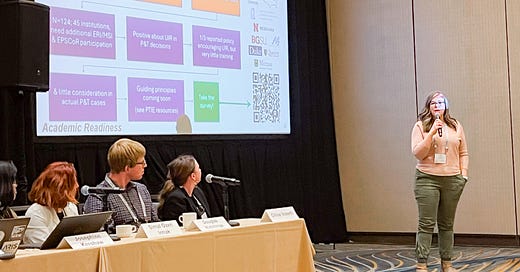Assessing Academic Readiness for Use-Inspired Research
Umbrella Working Group #6: Assessing Academic Readiness for Use-Inspired Research played a critical role in understanding how institutions and faculty engage with use-inspired research. Through targeted surveys and data-driven analysis, this UWG worked to explore institutional perceptions as well as readiness to integrate use-inspired research into academic settings.
Defining Use-Inspired Research and Institutional Engagement
One of the key objectives of this working group has been to refine and clarify the concept of use-inspired research while assessing how faculty and institutions perceive its role in academia. To gather meaningful insights, the team developed and disseminated a comprehensive survey aimed at characterizing institutional awareness, interest, and readiness for faculty participation in use-inspired research initiatives.
Broad Outreach and Data Collection
The survey reached a wide audience and was distributed through multiple channels, including:
The Promotion & Tenure – Innovation & Entrepreneurship (PTIE) coalition, targeting 249 contacts.
Minority-Serving Institutions (MSIs), engaging 121 affiliated individuals.
An ad hoc committee at Boise State University, which is revising its tenure and promotion policies.
The Association of Public Land-grant Universities (APLU) conference, reaching attendees interested in higher education innovation.
EPSCoR (Established Program to Stimulate Competitive Research) jurisdictions to ensure representation from underfunded research institutions.
LinkedIn, expanding outreach to a broader academic and professional audience.
Translating Findings into Actionable Insights
The working group synthesized results into a 22 page report, providing valuable preliminary data on the current landscape of institutional support for use-inspired research. View this document below.
The survey revealed a broad agreement among respondents on the importance of evaluating UIR in faculty promotion and tenure processes. A majority expressed confidence in their ability to assess UIR activities, with notable emphasis on recognizing faculty contributions to preparing students for UIR-related careers. However, responses highlighted variability in institutional policies and practices, with many institutions lacking explicit guidelines for considering UIR in promotion and tenure. While UIR activities were acknowledged in disciplines like Applied/ Professional Sciences and Natural Sciences, they were often optional rather than required components of the review process. Awareness of UIR-specific training and support, especially for underrepresented faculty groups, was limited, signaling potential areas for institutional improvement.
Findings from the survey may serve as an initial framework to guide future, more extensive research and provide a foundation for planning deeper inquiries into UIR practices. They may also guide strategy to support leaders and researchers aiming to enhance UIR integration and develop targeted strategies for advancing UIR across diverse institutional contexts. These findings will also guide ongoing efforts by PTIE and other stakeholders to advocate for policy changes, faculty support mechanisms, and enhanced integration of use-inspired research within academic systems.
By assessing academic readiness, this initiative is laying the groundwork for long-term systemic changes in research culture. The insights gained from the survey will inform strategies to enhance faculty engagement, create supportive institutional policies, and drive broader adoption of use-inspired research methodologies.
Members of UWG #6 include Ralph House, Julie Risien, Laura Regassa, Jana Bouwma-Gearhart, James McLellan, Nathan Meier, Hyoung Joon Park, and Jeni Reininga.
Work related to this post was funded under NSF Grant #FAIN-2309541.




